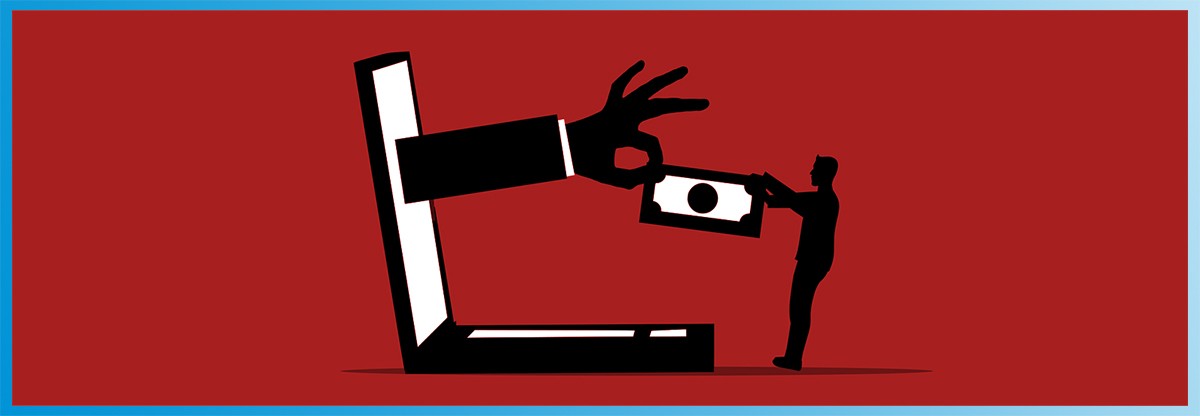Intellectual Property Insights from Fishman Stewart
Mini Article – Volume 22, Issue 6
Share on Social

Scamwatch: “Money, Honey”
Is it just me or is everyone on scam-overload? From “phishing” emails announcing “prizes” that are malware, to “contractors” who, after taking your “deposit,” never show up.
The latest scams are coronavirus-related and they are rampant. As of January 29th of this year, the Federal Trade Commission had logged more than 676,000 consumer complaints related to COVID-19 since January 2020, nearly three-quarters of which involved fraud, such as the sale of fake at-home rapid tests, or charging for tests that are otherwise administered for free.
No surprise, then, that a recent FBI report shows that the Justice Department is seriously failing to combat internet fraud. The FBI annual report on Internet Crime for 2020, says that the Department’s Internet Crime Complaint Center received a record number, 791,790, with reported losses exceeding $4.1 billion. This represents a 69% increase over total complaints submitted in 2019.
The U.S. Patent and Trademark Office (“PTO”) has not been immune from scamming. We recommend that owners of trademark applications or registrations check out the “SCAM ALERT” webpage, HERE. Basically, trademark scammers will extract publicly available data, such as trademark applicants’ and registrants’ names, phone numbers and addresses, and then mail, email, or text trademark-related solicitations to applicants and registrants that appear to be from the PTO.
For example, a solicitation may be a notice of an upcoming filing deadline with an offer of services to respond to the deadline, usually requiring a fee. While these solicitations may often contain correct information (for example, that a filing is due to keep a registration active), you are never required to use the services offered by these companies, and indeed, some are actual scams offering unneeded services or requesting the payment of fees that are not due.
At least the PTO is cracking down. In March 2017, the fraudster company “Trademark Compliance Center” was convicted of money laundering involving a trademark renewal scam. Similarly in 2021, a federal court in South Carolina sentenced the scammer behind the entities “Patent and Trademark Office” and “Patent and Trademark Bureau” on four counts of federal mail fraud for creating a false association with the PTO and deceiving trademark owners into paying expensive fees.
How can I tell the difference between potentially misleading trademark offers and notices and legitimate PTO emails and notices?
Per uspto.gov, all official correspondence about your trademark application or registration will be from the “United States Patent and Trademark Office” in Alexandria, Virginia, and all emails will be from the domain “@uspto.gov.”
Further, and no surprise, the scammers send the fraudulent letters directly to the parties, not their attorneys. When a party is represented by counsel, the PTO only communicates with counsel. Thus, if you are represented by counsel, anything you directly receive that appears to be from the PTO, is likely to be a scam.
As with all facets of online life, it pays to be vigilant.
Published March 25, 2022


Related Content from Fishman Stewart
People have long pondered whether or not the Giza pyramids were indeed solely burial chambers, which was the only known, and archaeologically determined, use—until now.
By 1930, efforts began in New York to replace Mother's Day with Parent's Day because men were more than just breadwinners. Those efforts didn't catch on, probably because in that era, women often spent more time in the home.
In February, Nike and Skims announced that they will be working together on a new brand, NikeSkims. The co-brand will create a new line of training apparel, footwear, and accessories specifically designed to meet the unique needs of women athletes.
Generally, federal courts have exclusive jurisdiction over copyright cases, and often, this presents an insurmountable paywall for individual artists and small businesses to vindicate their rights, especially where the value of the individual copyrighted works are relatively low.
Dedicated to raising public awareness about the importance of encouraging innovation and creativity throughout the world, the World Intellectual Property Organization (WIPO) annually observes World Intellectual Property Day on April 26 to showcase the role that patents, trademarks, industrial designs, copyrights and trade secrets play in our everyday lives.
Hold onto your foam fingers, sports fans – college sports just got a whole lot more interesting! The latest updates to Name, Image, and Likeness (NIL) rules are making student-athletes bigger than ever, and it’s not just about the game anymore.
Did a federal court in Louisiana recently decide that US copyrights are global rights? It seems so.
One of his most famous songs, “Lose Yourself” was recently at the center of a lawsuit. In 2019, Eminem’s publishing company Eight Mile Style sued Spotify claiming that Spotify streamed a number of its musical compositions without proper licenses.
One of the most common challenges is whether AI should be free to train on data that is protected by copyright and owned by third parties without first obtaining permission.
The U.S. Copyright Office (USCO) recently published its latest report on AI and “copyrightability.” In short, the USCO considers only some AI-generated works to be sufficiently creative as to deserve copyright protection, and thus, registration.
IDENTIFYING, SECURING AND ADVANCING CREATIVITY®












